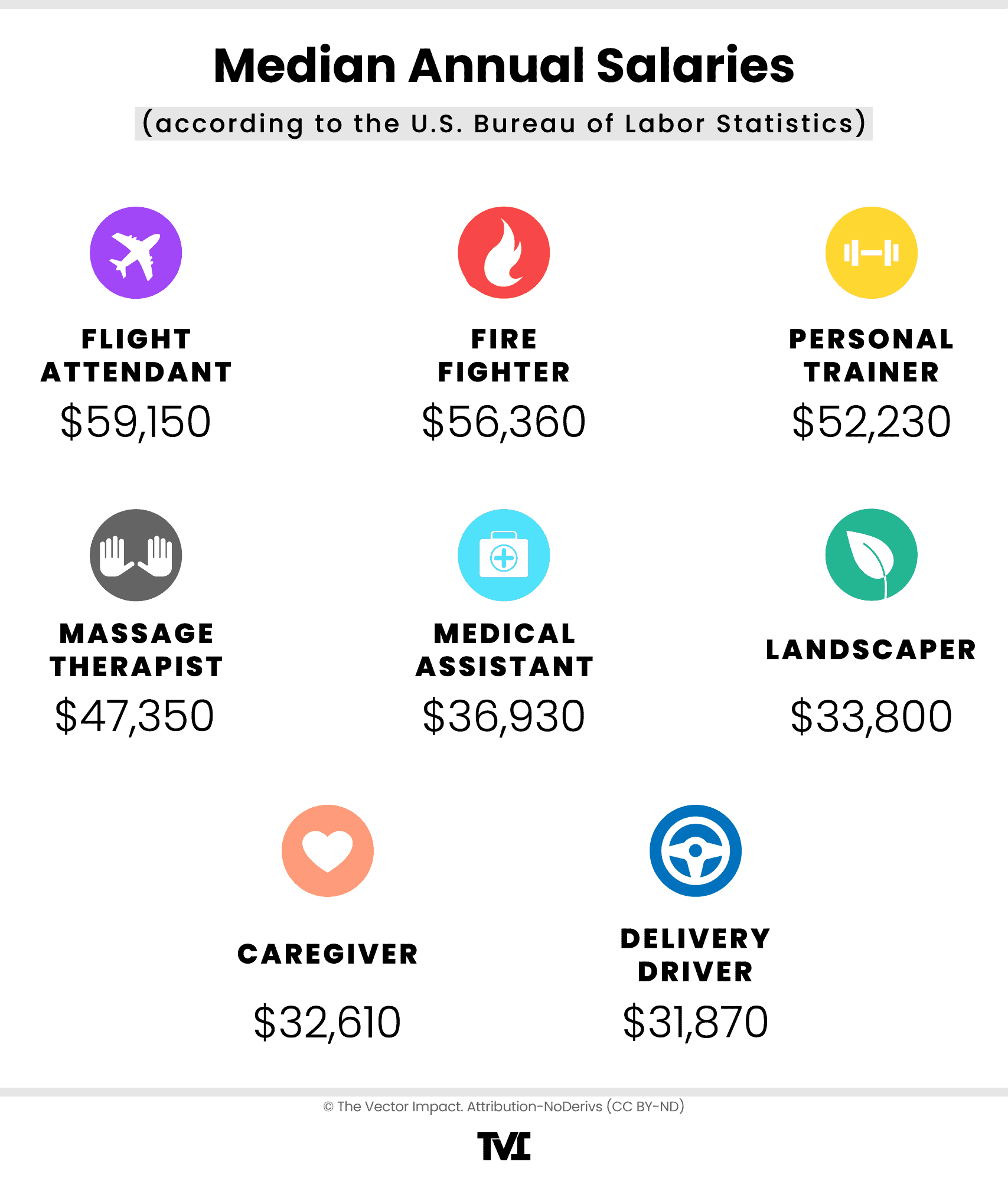Table of Contents
I’ve been to dozens of job interviews since I graduated from college way back in 2008 (yes, I know I’m 👴). Do you know how many times I’ve been asked about my degree?
Exactly zero.
What’s more, when I moved abroad to Australia for a few years, I discovered something else: Few countries outside of the U.S. put as much emphasis on a college degree as the United States.
Don’t get me wrong—I had some of the best experiences of my life in college. But I was making hefty loan payments for nearly two decades after graduation, and I’ve had this thought more than once: “Was my college life worth the price I paid for it?”
Your parents and teachers may still give you unsolicited advice about the importance of college, but the truth of the matter is, college isn’t for everyone.
Fortunately, the world is a lot different than it was when I graduated. Now, there are more alternatives to college than ever before.
If you’re wondering what to do if college isn’t for you, I’ve got you covered. Here are a whole bunch of career paths you can follow, none of which require a stint on campus.
Signs college isn’t for you
If you’re reading this article, it’s clear you’re already wondering whether four years at a college or university is the right move for the next stage of your life, after you leave home. But it’s all right if you’re still on the fence.
The truth is, some people are more suited for college than others. Here are a few signs college isn’t for you:
You haven’t enjoyed the academic side of school
Let’s be clear: There’s a huge difference between high school and college.
In a university or college, you’ll have much more control over what classes you take and your schedule. You’ll also have to be more independent and motivated to get to class without your parents or teachers making you.
But if you’ve found that, overall, your academics in high school haven’t been enjoyable or at least engaging, then an alternative to college might be a better idea. While it’s natural to enjoy some high school classes more than others, if you didn’t like much of it at all, it may be that you simply aren’t the type of person who learns best in a classroom setting. And if that’s the case, college might not be for you.
You’re historically someone who breaks the mold
There are a lot of false stereotypes about GenZ out there, but one thing’s for sure—the generation currently entering their college years are more than willing to break the mold.
While Baby Boomers and Millennials often subscribed to the notion that the only correct path was to go from high school to college to a career, there are many members of the younger generations who understand this path isn’t right for them.
If you’re someone who has often gone against the grain, then trying to force yourself to follow a “traditional” path could be a bad move.
You’re concerned about your financial future
There are ways to go to college without going broke. Community colleges are often more affordable, you can use scholarships and grants to lower costs, or you can work while in college.
But many students in the United States end up taking out loans and/or depleting their savings while in college (including yours truly, and I did work all four years in college). Even if you intend to work while in school, it’s possible you’ll discover your course load doesn’t allow you to do so.
If you’re worried about money in your immediate future, then college might not be the right move right now. Instead, a job where you can earn and save money right away might be better—and you can consider college later if you decide you want that degree after all.
If you do decide college is for you, then be sure to check out these articles that can help you manage finances while you study:
You aren’t sure what you want in life
Before you dive into the college alternatives listed below, there’s an important question you need to answer:
“What do I want to do with my life?”
It’s a big question, and you don’t need to have a definitive answer now (or any time soon). But it’s worth pondering this question before you decide whether or not you want to go to college. And if you do decide higher education isn’t for you, then thinking carefully about your passions will definitely help you make a decision when considering alternatives to college.
Fortunately, we have a guide that can help you start exploring this question.
Option 1: Dive right into your first job
Don’t believe people who tell you a college degree is a prerequisite for finding a job that brings you joy and a decent income. There are plenty of alternative career paths that can do both.
Hands-on apprenticeships
If you want to start earning money right away and open up major job prospects for the future, then an apprenticeship might be the way to go.
During an apprenticeship, you’ll work directly with a mentor who teaches you a new skill on the job—you’ll literally be paid to learn. Once you earn your credentials, you’ll have the opportunity to make even more money or turn your newfound skills into your own business. (More on that below.)
The U.S. Government has a website that allows you to look for apprenticeships in your area. You can check it out here.

You have lots of options when it comes to choosing an apprenticeship. The best way to narrow down your choices is to think about your current set of skills and passions.
For example, if you’re someone who enjoys working with your hands, you may consider an apprenticeship that would train you to be an electrician, a mechanic, or a farmer. If you’re good with technology, apprenticeships in software development or computer engineering might be the right path for you.
The choice is yours—start digging in, and you’ll likely find something that suits your ideal career path.
Leverage your network to find a job
If you want to land a traditional job, but you’re worried the lack of a degree will hold you back, try finding a non-traditional way to get your foot in the door.
You can do this by building a solid network, and then leveraging those relationships to find a career that suits you.
You don’t need work experience to start building a network. All you need is a little bit of time and patience.
The best place to start building a network is through LinkedIn. Before you groan, trust me—it isn’t the stuffy social media platform it used to be. There are lots of people who are active on the platform and looking to make new connections—and one of those folks may be the person who helps you find your next job.
The first step for using LinkedIn to land a job is to set up an attractive profile. We have a few guides that can help you get started:
Once you’ve done that, spend a bit of time every day making new connections. All you need to do is use the platform’s search function to find people who are doing what you want to do. Send them a connection with a request and a friendly note, something like: “Hello! I’m looking to start a career in _______. I saw you are currently working as a _________, and I’m hoping I can learn more from you.”
As your LinkedIn network grows, you’ll start to see your feed fill up with posts from your connections. These alone can help you learn a lot, but it’s also important to engage with them by leaving thoughtful comments and re-sharing content you like.
When you’re ready, start making some posts of your own, and don’t shy away from DMing people who interest you, introducing yourself, and asking them polite questions.
If LinkedIn isn’t your speed, you can use this same method on Twitter, or start hunting through Facebook groups or Reddit forums. All of these platforms are filled with people who may become your mentors.
Other jobs that don’t require a degree
There are plenty of jobs you can apply for that don’t require a college degree. Most will require training and certification of some sort, but typically at a much lower cost than a four-year college degree.
Here’s a list to start you off. Bear in mind, these are starting salaries—if you stick with one of these careers, expect your income to go up as you gain experience.
Option 2: Get an alternative education
You may not want to spend the next four years on a college campus, but there are still lots of options that you can tap into to further your education and widen your employment opportunities.
Get a two-year degree
Going to college for four years might sound overwhelming and expensive. But what if you could get a taste of the college experience, for a much lower cost, and in half the time?
If this sounds appealing, consider getting a two-year degree. There are so many options to choose from when it comes to two-year degrees. According to Indeed, these are some of the highest-paying industries you can enter with a two-year degree:
- Interior design
- Electrical engineering
- Dental Hygiene
- Radiation therapy
- Nursing
- Robotics
- Mortuary sciences (aka the funeral industry)
Consider massage therapy
If you are interested in medical sciences, enjoy working with your hands, or have a strong drive to help others, then your alternative path after college might lead you to massage school.
Each state has its own requirements for certification, and the type of massage you want to perform will also affect the length of time it will take. But if you see it through, you could be working and earning a living as a massage therapist in just a few months.
Get certified at beauty school
In most states, you’ll only need to invest 1,000 – 2,000 hours of your time to earn your cosmetology degree. Then you can take that degree and build a lifestyle for yourself that has plenty of perks—flexibility over your hours and location, a wide variety of specialties to increase your value, and a chance to work with people every day.
Option 3: Learn a valuable skill at your own pace
You don’t need to go to an expensive college to get an education. Today it’s easier than ever to follow your own path through an online course or other alternatives to college.
Teach yourself how to code
The world needs more talented coders—people who can design websites, apps, or other digital platforms. And there are tons of online courses you can take to earn a coding certificate that will open up job opportunities.
Another excellent benefit of coding—it’s a skill that can serve you in a variety of career paths. Nearly every business in existence today has a website, and many rely on their websites to drive the majority of their revenue. With coding on your list of skills, your value as an employee increases in the eyes of lots of employers.
Below we’ve listed a number of good coding programs. Some are free coding bootcamps, others have a small cost or allow you to pay with loans or defer tuition payments.
Pursue a career in digital marketing
If you’re passionate about marketing, you can easily pick up skills in the digital marketing space through an online course. You can specialize in different areas, like search engine optimization, copywriting, web design, paid advertising, or social media.
There are so many courses online to choose from, but some of the best and most affordable are hosted on Coursera, Udemy, and LinkedIn Learning.

Become a sales superstar
To get a job in the sales world, all you need is an outgoing personality, some problem-solving skills, and an understanding of the best persuasion techniques. No degree required.
Of course, it wouldn’t hurt to augment your resume with some additional skills you pick up through an online course. Here are a few examples:
Sales Strategies and Approaches in a New World of Selling LinkedIn Learning
Social Selling Success from Sandler
Practical Sales Techniques from Udemy
General Sales Courses from MasterClass
Option 4: Discover the rest of the world
In other countries, it’s a rite of passage for young adults to embark on a “gap year” after finishing high school. They use this time to traverse the globe and immerse themselves in diverse cultures and locations.
Some people spend time working for a few months to save up for a trip (maybe while living at home to save money). Or, if you think you’d like traveling long-term, there are ways you can earn money while on the move.
Try life as a digital nomad
Across the globe, people are embracing the digital nomad lifestyle, living without a fixed address, and earning a living remotely as they journey across continents.
And since 2020, it’s become easier than ever to earn money remotely. How do I know? I lived the digital nomad life myself for years, and loved it.
As you might have guessed, I work in content marketing, which allowed me to earn money while traveling. I loved the freedom and adventure of the lifestyle—but it’s not for everyone.
If you’re interested in living abroad as an alternative to college, check out my honest guide to the digital nomad lifestyle.
Become an au pair

If you like working with kids, then this is a great job opportunity. You can live in a different country and earn a decent wage while helping busy parents care for their children. Check out sites like AuPair.com and GoOverseas to see what jobs are available.
Make a living as a house or pet sitter

The best part about housesitting is you can experience new countries like a local—and your accommodation will be covered. And if you like animals, then you can make even more money taking care of people’s pets while they’re away. Start your search on places like TrustedHousesitters.com, WorkAway, or Nomador.
Teach English (or another language)

You can use your language skills to make money while living in a country. Many websites match teachers with school openings, or you can strike out on your own and become a tutor. If you prefer the former, take a look at TeachAway or GoAbroad, or think of a country you’d like to go to and see what you can find on Google.
Apply to the Peace Corps or AmeriCorps

Do you like the idea of spending your time after high school serving communities in need? Then you might want to consider joining the Peace Corps or AmeriCorps, two organizations that place volunteers in long-term positions. In the Peace Corps, if you’re accepted, you’ll likely be sent somewhere overseas to live and serve in a community abroad for two years. AmeriCorps functions similarly but operates within communities in the United States.
Option 5: Start your own business
Why work for someone else when you can be your own boss? Starting your own business takes time to get started, but it’s worth the investment if your goals in life are centered around financial and geographical freedom.
If working for yourself sounds appealing, I’m not going to send you anywhere else—your journey can start right here. We have a whole library of articles about turning your side hustle, hobbies, or passions into money-makers:
There’s no reason you need to sink yourself into debt at a university or commit four years to a career path you aren’t sure you want.
If college isn’t for you, then carve your own path. You can use any number of these college alternatives to find a career you love.

























